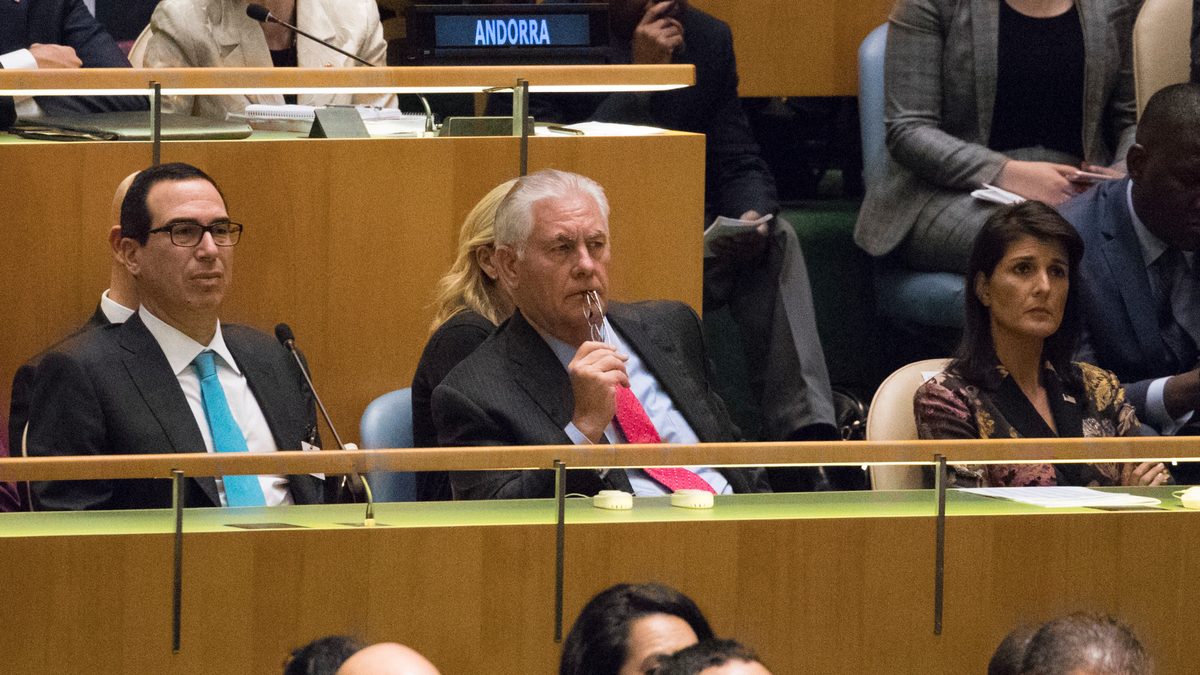
NEW YORK – Secretary of State Rex Tillerson spoke by phone Tuesday with Myanmar's civilian leader Aung San Suu Kyi about the Rohingya Muslim refugee crisis, the State Department said, as international condemnation intensified over the plight of the minority group.
It was believed to be the first time Tillerson has spoken to Suu Kyi since he took office in February.
The top U.S. diplomat is currently at the annual gathering of world leaders at the United Nations, where governments have strongly criticized Myanmar's conduct. Suu Kyi, who serves as state counsellor and foreign minister, has skipped the gathering.
More than 500,000 people — roughly half the Rohingya population in Myanmar — have fled to neighboring Bangladesh in the past year. Most of them have fled across the border in the last three weeks, since Myanmar's military began a crackdown in response to Rohingya insurgent attacks. Security forces and allied mobs have burned down thousands of Rohingya homes in the predominantly Buddhist nation.
Top U.N. officials have described the current crackdown as ethnic cleansing.
State Department spokeswoman Heather Nauert said that in Tuesday's call, Tillerson welcomed the Myanmar government's commitment to end the violence in Rakhine State and to allow those displaced by the violence to return home. He also urged the government and military to facilitate humanitarian aid for displaced people in the affected areas, and to address deeply troubling allegations of human rights abuses and violations.
In a speech in Myanmar on Tuesday, Suu Kyi said her country does not fear international scrutiny and invited diplomats to visit some affected areas. She also said that those who fled to Bangladesh would be allowed to return if they passed a "verification" process.
She did not address the allegation of ethnic cleansing. She said that while many villages were destroyed, more than half were still intact.
The conflict is overshadowing Myanmar's historic shift from five decades of direct military rule following elections and the installation of Suu Kyi's government last year. That transition was a key foreign policy achievement of the Obama administration. President Donald Trump has been less attentive to the country, which is also known as Burma.
Last week, Tillerson gave the toughest condemnation yet from a Trump administration official of the persecution of the Rohingya and demanded the violence stop.
A senior State Department official said Tillerson on Tuesday urged Suu Kyi to grant access to U.N. monitors. Tillerson also asked if the U.S. could provide assistance. The official was not authorized to discuss details of the call and requested anonymity.
Several world leaders raised the plight of the Rohingya as the U.N. General Assembly opened its annual session Tuesday.
On Monday, several Muslim-majority and Western governments — the United States among them — urged senior Myanmar officials at a closed meeting to stop abuses against Rohingya and restore humanitarian access.
More evidence is emerging of destruction of Rohingya settlements inside Rakhine. Satellite imagery released by Human Rights Watch showed massive swaths of scorched landscape and the near total destruction of 214 villages.
In the U.S. Congress, Bob Corker, Republican chairman of the Senate Foreign Relations Committee, on Tuesday sharply criticized Suu Kyi as "dismissive of human rights concerns" in the face of a "horrific humanitarian crisis."
"As a national figure, Aung San Suu Kyi must demonstrate far greater leadership in efforts to stop the bloodshed or risk destroying her reputation as a force for continued progress in Burma," Corker said.









































